

A Dialogue on the Best Form of Government - Sir George Cornewall Lewis. Henry Brougham, 1st Baron Brougham and Vaux. Sir Henry Brougham by John Adams Acton 1867 Henry Peter Brougham, 1st Baron Brougham and Vaux, PC, QC, FRS (; 19 September 1778 – 7 May 1868) was a British statesman who became Lord High Chancellor and played a prominent role in passing the 1832 Reform Act and 1833 Slavery Abolition Act.
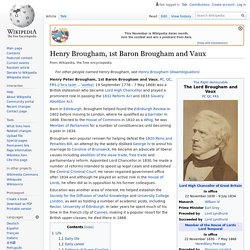
Brougham won popular renown for helping defeat the 1820 Pains and Penalties Bill, an attempt by the widely disliked George IV to annul his marriage to Caroline of Brunswick. He became an advocate of liberal causes including abolition of the slave trade, free trade and parliamentary reform. Appointed Lord Chancellor in 1830, he made a number of reforms intended to speed up legal cases and established the Central Criminal Court. He never regained government office after 1834 and although he played an active role in the House of Lords, he often did so in opposition to his former colleagues. Education was another area of interest. Life[edit] Early life[edit] Early career[edit] Charles Grey, 2nd Earl Grey. Prime Minister of the United Kingdom of Great Britain and Ireland.
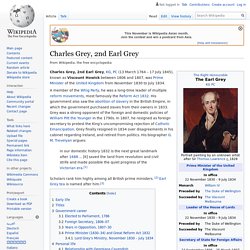
Henry Peter Brougham, 1st Baron Brougham and Vaux. Considerations on Representative Governm. Considerations on Representative Government. Considerations on Representative Government is a book by John Stuart Mill published in 1861.[1][2] Summary[edit] Mill argues for representative government, the ideal form of government in his opinion.
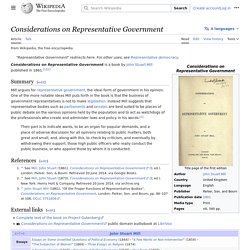
One of the more notable ideas Mill puts forth in the book is that the business of government representatives is not to make legislation. Instead Mill suggests that representative bodies such as parliaments and senates are best suited to be places of public debate on the various opinions held by the population and to act as watchdogs of the professionals who create and administer laws and policy. In his words:[3] Their part is to indicate wants, to be an organ for popular demands, and a place of adverse discussion for all opinions relating to public matters, both great and small; and, along with this, to check by criticism, and eventually by withdrawing their support, those high public officers who really conduct the public business, or who appoint those by whom it is conducted.
John Stuart Mill. John Stuart Mill (20 May 1806 – 7 May 1873),[8] usually cited as J.
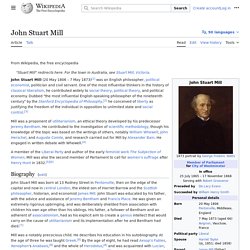
S. Considerations on Representative Government - John Stuart Mill. Considerations on Representative Government - John Stuart Mill. Bertrand Russell. Russell led the British "revolt against idealism" in the early 20th century.[58] He is considered one of the founders of analytic philosophy along with his predecessor Gottlob Frege, colleague G.
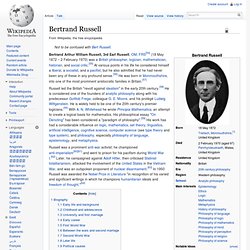
E. Moore, and his protégé Ludwig Wittgenstein. He is widely held to be one of the 20th century's premier logicians.[55] With A. N. Whitehead he wrote Principia Mathematica, an attempt to create a logical basis for mathematics. Bertrand Russell. 1.
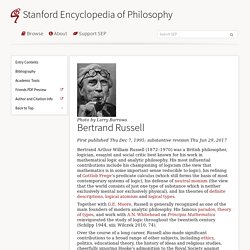
Russell’s Chronology A short chronology of the major events in Russell’s life is as follows: Attempts to sum up Russell’s life have been numerous. One of the more famous comes from the Oxford philosopher A.J. Ayer. Biography, Essays, Philosophy, & Facts. Bertrand Russell, in full Bertrand Arthur William Russell, 3rd Earl Russell of Kingston Russell, Viscount Amberley of Amberley and of Ardsalla, (born May 18, 1872, Trelleck, Monmouthshire, Wales—died February 2, 1970, Penrhyndeudraeth, Merioneth), British philosopher, logician, and social reformer, founding figure in the analytic movement in Anglo-American philosophy, and recipient of the Nobel Prize for Literature in 1950.
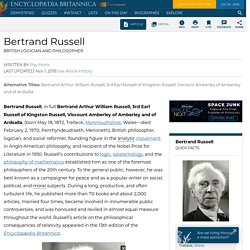
Russell’s contributions to logic, epistemology, and the philosophy of mathematics established him as one of the foremost philosophers of the 20th century. Walter Bagehot. Walter Bagehot ( BAJ-ət; 3 February 1826 – 24 March 1877) was a British journalist, businessman, and essayist, who wrote extensively about government, economics, literature and race.
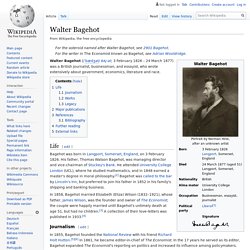
Life[edit] Bagehot was born in Langport, Somerset, England, on 3 February 1826. His father, Thomas Watson Bagehot, was managing director and vice-chairman of Stuckey's Bank. He attended University College London (UCL), where he studied mathematics, and in 1848 earned a master's degree in moral philosophy.[2] Bagehot was called to the bar by Lincoln's Inn, but preferred to join his father in 1852 in his family's shipping and banking business.
Journalism[edit] Works[edit] The Economist. English weekly news and international affairs publication The Economist takes an editorial stance of classical and economic liberalism that supports free trade, globalisation, free immigration and cultural liberalism (such as supporting legal recognition for same-sex marriage or drug liberalisation).[2] The publication has described itself as "a product of the Caledonian liberalism of Adam Smith and David Hume".[11] It claims an audience containing many influential executives and policy-makers.[12][better source needed] The publication's CEO described this recent global change,[clarification needed] which was first noticed in the 1990s and accelerated in the beginning of the 21st century as a "new age of Mass Intelligence".[13][14] History[edit]

The Fortnightly Review. British fortnightly magazine.
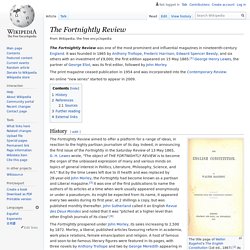
The Fortnightly Review. William Ewart Gladstone. In 1868, Gladstone became Prime Minister for the first time. Many reforms were passed during his first ministry, including the disestablishment of the Church of Ireland and the introduction of secret voting. After electoral defeat in 1874, Gladstone resigned as leader of the Liberal Party. From 1876 he began a comeback based on opposition to Turkey's reaction to the Bulgarian April Uprising. His Midlothian Campaign of 1879–80 was an early example of many modern political campaigning techniques.[1][2] After the 1880 general election, Gladstone formed his second ministry (1880–1885), which saw the passage of the Third Reform Act as well as crises in Egypt (culminating in the Fall of Khartoum) and Ireland, where his government passed repressive measures but also improved the legal rights of Irish tenant farmers.
Back in office in early 1886, Gladstone proposed home rule for Ireland but was defeated in the House of Commons. Early life[edit] Robert E. Lee. General in Chief of the Armies of the Confederate States Robert Edward Lee (January 19, 1807 – October 12, 1870) was an American and Confederate soldier, best known as a commander of the Confederate States Army. He commanded the Army of Northern Virginia in the American Civil War from 1862 until its surrender in 1865. A son of Revolutionary War officer Henry "Light Horse Harry" Lee III, Lee was a top graduate of the United States Military Academy and an exceptional officer and military engineer in the United States Army for 32 years.
Appomattox, Virginia. Town in Virginia Appomattox is a town in Appomattox County, Virginia, United States. The population was 1,733 at the 2010 census. It is the county seat of Appomattox County.[5] Appomattox is part of the Lynchburg Metropolitan Statistical Area. History[edit] American Civil War. Internal war in the U.S. over slavery. Schleswig-Holstein. State in Germany Schleswig-Holstein (German: [ˈʃleːsvɪç ˈhɔlʃtaɪn]) is the northernmost of the 16 states of Germany, comprising most of the historical duchy of Holstein and the southern part of the former Duchy of Schleswig. Its capital city is Kiel; other notable cities are Lübeck and Flensburg.
Also known in more dated English as Sleswick-Holsatia, the region is called Slesvig-Holsten in Danish and pronounced [ˌsleːsvi ˈhɒlsteːˀn]. Queen Victoria. Albert, Prince Consort. Husband of Queen Victoria Prince Consort. John Brown. James Cowles Prichard. James Cowles Prichard, FRS (11 February 1786 – 23 December 1848) was a British physician and ethnologist with broad interests in physical anthropology and psychiatry. Charles Darwin. English naturalist and biologist Charles Robert Darwin FRS FRGS FLS FZS[2] (;[5] 12 February 1809 – 19 April 1882) was an English naturalist, geologist and biologist,[6] best known for his contributions to the science of evolution. [I] His proposition that all species of life have descended over time from common ancestors is now widely accepted, and considered a foundational concept in science.[7] In a joint publication with Alfred Russel Wallace, he introduced his scientific theory that this branching pattern of evolution resulted from a process that he called natural selection, in which the struggle for existence has a similar effect to the artificial selection involved in selective breeding.[8] Darwin has been described as one of the most influential figures in human history,[9] and he was honoured by burial in Westminster Abbey.[10]
Alfred Russel Wallace. Herbert Spencer. English philosopher and political theorist Herbert Spencer (27 April 1820 – 8 December 1903) was an English philosopher, biologist, anthropologist, and sociologist famous for his theory of social Darwinism whereby superior physical force shapes history.[1] Spencer originated the expression "survival of the fittest", which he coined in Principles of Biology (1864) after reading Charles Darwin's On the Origin of Species. The term strongly suggests natural selection, yet Spencer saw evolution as extending into realms of sociology and ethics, so he also supported Lamarckism.[2][3] Henry James Sumner Maine. Sir Henry James Sumner Maine, KCSI (15 August 1822 – 3 February 1888), was a British Whig[1] comparative jurist[2] and historian.[3] He is famous for the thesis outlined in his book Ancient Law that law and society developed "from status to contract.
Ancient Law. Ancient Law is a book by Henry James Sumner Maine. It was first published in octavo in 1861.[1] The book went through twelve editions during the lifetime of the author.[2] The twelfth edition was published in 1888.[3] A new edition, with notes by Frederick Pollock, was published in octavo in 1906.[4][5][6] Lectures delivered by Maine for the Inns of Court were the groundwork for Ancient Law. Ancient Law: Its Connection with the Early History of Society and Its ... - Henry Sumner Maine. John Lubbock, 1st Baron Avebury. Early life[edit] Pre-historic Times: As Illustrated by Ancient Remains, and the Manners and ... - Sir John Lubbock. John Lubbock's "Pre-Historic Times" is Published : History of Information. Researches Into the Early History of Mankind and the Development of Civilization - Edward Burnett Tylor. Researches into the Early History of Mankind and the Development of Civilization.
Researches into the early history of mankind and the development of civilization : Tylor, Edward Burnett, Sir, 1832-1917 : Free Download, Borrow, and Streaming. Lessons in elementary physiology : Huxley, Thomas Henry, 1825-1895 : Free Download, Borrow, and Streaming. Thomas Henry Huxley. Thomas Henry Huxley. Thomas Henry Huxley. Thomas Henry Huxley. Physics and Politics: Or, Thoughts on the Application of the Principles of ... - Walter Bagehot. Physics and Politics by Walter Bagehot.
Physics and Politics: Or, Thoughts on the Application of the Principles of ... - Walter Bagehot. Henry Thomas Buckle. Alpheus Todd. Alpheus Todd. University of Melbourne. William Hearn. Whig. Third Derby–Disraeli ministry. Lord Derby - History of government. THE QUEEN'S SPEECH. (Hansard, 5 February 1867) Prussia. Battle of Königgrätz. Austro-Prussian War. Battle of Königgrätz. The Battle of Königgrätz. 150 years on – The Battle of Königgrätz, 3 July 1866 – Historic Musings.
Franco-Prussian War. The English Constitution. The English Constitution. The two-House system. Hyde Park, London. Napoleon III. Homersham Cox. Francis Jeffrey, Lord Jeffrey. Jay Park. Prime minister of United Kingdom. Parliamentary government considered with reference to a reform of Parliament. : An essay. By Earl Grey by Grey, Henry George 3rd Earl Grey (1802-1894): London : Richard Bentley, New Burlington Street, Publisher in Ordinary to Her Majesty First Edition. -
House of Commons of the United Kingdom. David Hume. Dugald Stewart. A Plea for the Constitution - John Austin. A Plea for the Constitution - John Austin. John Austin. Jeremy Bentham. Thomas Babington Macaulay. The History of England: From the Accession of James the Second - Thomas Babington Macaulay Baron Macaulay. The History of England from the Accession of James the Second. A Dialogue on the Best Form of Government - Sir George Cornewall Lewis. A Dialogue on the Best Form of Government (1863) : George Cornewall Lewis : 9781164523673. A Dialogue on the Best Form of Government : Sir George Cornewall Lewis : Free Download, Borrow, and Streaming. George Cornwell. Anthony Trollope. Can You Forgive Her? Can You Forgive Her? - Anthony Trollope. Palliser novels. Richard Crossman. Benjamin Disraeli. An essay on the history of the English government and constitution, from the reign of Henry VII. to the present time : Russell, John Russell, Earl, 1792-1878 : Free Download, Borrow, and Streaming.
John Russell, 1st Earl Russell. James Mills. Dorset. Earl of Carnarvon. England v Scotland (Edinburgh 1886) by Overend and Smythe. Gurney's Bank. David Eastwood. Marquess of Salisbury.